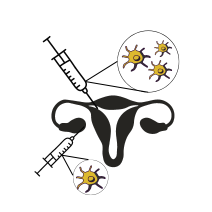Embryo Donation
The procedure of embryo donation involves the frozen embryo transfer of frozen embryo that was obtained via In-vitro fertilization using the egg and sperm of unrelated and anonymous donors.
Embryo Donation may be required in situations like:
- When both the male partner and the female partner are infertile
- When a Single woman with no oocytes of her own intends to become a mother.
Who are Eligible for Embryo donation in India
In the past Embryo donation in India was done using donated embryos – that is Couples who underwent IVF treatment would give consent to donate the leftover embryos to other infertile couples, who were not able to conceive via IVF using their gametes. The choice for Embryo Donation in India was up to the couple whether they want to donate or destroy the embryos. The embryos are usually donated after the couple conceived with their own embryo and carried the successful pregnancy to term and they did not need their left-over embryos for future pregnancies.
The current ART laws that came into place in 2021 prohibit the donation of embryos by couples who have undergone IVF.
Now an donor embryos are prepared using donor oocytes and donor sperms and stored in ART banks. Clinics or couples needing donor embryos approach the ART banks for the same.
Indian Couples can opt for Embryo Donation if both partners are infertile, and they have been recommended this option by the Doctors. They need to have valid medical reasons for undergoing this process. The process requires the consent of both the third-party Sperm and Oocyte Donors and the couple seeking third-party services.
Embryo Donor Program
An Embryo Donor Program helps connect couples and individuals with donated embryos to achieve their dream of parenthood. These programs provide access to a database of donor profiles, making it easier to find the right match. If you’re looking for embryo donation near me, these programs can help identify local options and clinics that meet your needs. Additionally, they offer legal support and counseling throughout the process, ensuring you feel confident and informed at every step. With an embryo donor program, you can choose the best option for your family while receiving comprehensive guidance and emotional support along the way.
Frozen Embryo Transfer Success
The success of a frozen embryo transfer relies on several factors, such as embryo quality, uterine health, and precise timing. Interestingly, frozen embryo transfers often achieve similar or even higher success rates compared to fresh transfers because the body isn’t subjected to the stress of ovarian stimulation. Fertility specialists closely monitor and select only the highest-quality embryos for freezing, significantly boosting the chances of implantation and pregnancy.
Additionally, factors like age, hormone levels, and overall health play a crucial role in the success of the procedure. To maximize the chances, fertility specialists will tailor the treatment plan to ensure the uterus is perfectly prepared for the transfer. With advancements in freezing techniques, frozen embryo transfers have emerged as a reliable and highly effective option for many aspiring parents.



